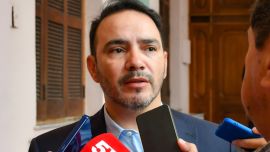The Senate approved the government-backed bill to introduce a so-called 'wealth tax' on 12,000 of Argentina's richest citizens late Friday night.
The move that will see a one-off levy slapped on the assets of those affected the legislation, with the proceeds destined to pay for coronavirus measures including medical supplies and relief for the poor and small businesses.
In a session streamed live on YouTube, and after a long and polarising debate, the so-called 'extraordinary solidarity contribution' was signed into law with 42 votes in favour and 26 against, as the ruling Frente de Todos coalition flexed its majority.
President Alberto Fernández's government hopes to raise 300 billion pesos (approximately US$3.75 billion) with the levy, which earlier passed the lower house Chamber of Deputies with 133 votes to 115.
Argentina has been badly hit by the coronavirus, with more than 1.4 million confirmed cases and over 39,500 deaths. The pandemic has exacerbated already high unemployment (now at 10.1 percent) and poverty (above 40 percent) rates in the country, which has been in recession since 2018.
Under the scheme – also dubbed the "millionaire's tax" – people with declared assets greater than 200 million pesos (US$2.4 million) will pay a progressive rate of up to 3.5 percent on wealth in Argentina and up to 5.25 percent on wealth outside the country.
Of the proceeds, 20 percent will go to medical supplies for the pandemic, another 20 percent to small and medium-sized businesses, 15 percent to social developments, 20 percent to student scholarships and 25 percent to natural gas ventures, according to the text of the bill.
Director of the ANSES tax agency Mercedes Marcó del Pont said it will affect almost 12,000 taxpayers, up from original estimates of some 9,000.
"The tax reaches 0.8 percent of total taxpayers," said one of the bill's authors, Frente de Todos lawmaker Carlos Heller.
"Forty-two percent have dollarised assets, of which 92 percent is located abroad," he added.
Heller said the plan was "far from taxing productive activity."
The bill was also spearheaded by Máximo Kirchner, the head of the ruling coalition's bloc in the lower house and the son of Vice-President Cristina Fernández de Kirchner.
“This is a unique, one-time contribution,” said Senator Carlos Caserio, a member of the committee responsible for the bill, according to a statement on the Senate’s website. “We’re coming out of this pandemic like countries come out of world wars, with thousands of dead and devastated economies.”
On the opposite side of the debate, Daniel Pelegrina, president of the powerful Argentine Rural Society (SRA), warned that Heller "wants to present it as a contribution of the richest, but we know what happens with all those unique taxes, they stay forever."
The centre-right Juntos por el Cambio coalition, of former president Mauricio Macri, has branded the move a "confiscatory" measure. It argues that investment will be at risk as a result of the bill – despite it affecting only individuals and not businesses – and that this is the equivalent of "double taxation" given existing laws such as the Personal Property tax.
More than 500 Argentines took up tax residency abroad this year, according to Bloomberg, almost half of them in Uruguay, which has been more effective in controlling the coronavirus pandemic. Non-resident deposits in Uruguayan banks have risen by at least US$500 million since it became clear last year that Fernandez would in the 2019 election.
In the past 21 years, Argentines have seen their incomes grow at a fifth of the pace of the rest of the world, according to opposition senator Martin Lousteau. “By the end of this year we will have the same income as in 1973,” he said, according to the Senate’s website.
Hernán Letcher, the director of the Center for Economic Policy Studies (CEPA), says the bill is representative of a wider push to ensure greater "tax justice."
"The proposal is not exclusive to Argentina and there are at least 11 countries in Europe and Latin America that are advancing in greater tax justic," he said. "These measures, to support family income and subsidies, are to mitigate inequality."
– TIMES/AFP/BLOOMBERG/PERFIL


























Comments